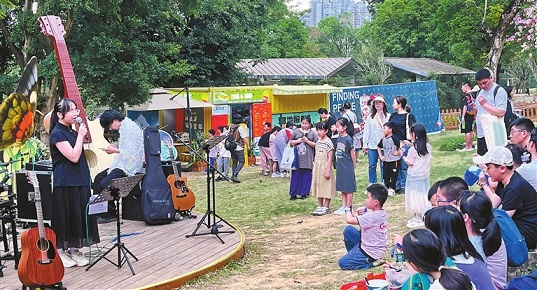Shenzhen
 2024/4/3
2024/4/3
 source: Shenzhen Daily
source: Shenzhen Daily
 Print
Print

A child sings during the BlueStar Music Festival in Lianhua Hill Park, Futian District. The four-day festival, which wrapped up yesterday, the 17th World Autism Awareness Day, aimed to help more people see the social value of people with autism. Zhang Yu

A charity sale is held for art derivatives created by children with autism in Lianhua Hill Park during the music festival. Courtesy of the organizer
Zhang Yu
JeniZhang13@163.com
MUSIC is often referred to as a universal language that has the remarkable ability to break barriers and forge connections.
In Lianhua Hill Park in Futian District, a music festival was held to arouse more people’s understanding of the autism community, recognize their value, and help them feel the warmth and care of society.
Autism remains a global public health problem. It is a neurodevelopmental disorder characterized by varying degrees of impairment that affects communication skills and social interactions.
Yesterday marked the 17th World Autism Awareness Day. The four-day BlueStar Music Festival, which wrapped up yesterday, was organized by the Shenzhen Employment Assistance Base for Autism Spectrum Disorder to help more people see the social value of people with autism.
Helping them
find self-worth
Children with autism are sometimes called “children of the stars” in China, as society often perceives them as lonely. They can exhibit unconventional emotional reactions, language abilities, or social skills.
According to Su Ting, founder of the Shenzhen Employment Assistance Base for Autism Spectrum Disorder, the festival aimed to make autistic teenagers feel accepted by society through music performances and interactions. It also sought to increase their social exposure and enhance their social skills and confidence.
“We also provide employment counseling and talent potential testing services for autistic youths during these four days, helping them identify their advantages and future directions,” Su said.
In addition to science popularization, charity sales, and interactive performances, the festival also featured recruitment for a number of programs including a designer training program, the BlueStar Music Band, and a delivery team for the Youth Music Dinner Bar.
A decade ago, Su, who is an art teacher, established the base together with five autistic young people at Wutong Mountain in Luohu District. The base gradually became a safe haven for many autistic children to learn painting and explore their potential.
Su said that her original intention was to provide comprehensive art education for children with autism, helping them to have a more complete life experience in the subsequent stages of life.
“We hope to create value with them through art and employment,” Su emphasized. “The essence of work is not simply about how much money one earns. If they have found self value, their life state will be different.”
Su believes that autistic people still have the ability to create some social value. “They may not be able to change the world or promote social development, but they can help. I really hope to lead them to independence and self-improvement,” she said.
In two days, Su received resumes from 43 autistic adolescents for the three employment programs. As of Monday afternoon, she had interviewed 12 applicants at the festival.
In the festival, several bands were invited to perform with autistic children. A charity sales area was set up, which showcased art derivatives created by children with autism. Meanwhile, multiple adult autistic art designers were on site to showcase their artwork and interact with residents.
Support for
autistic people
Statistics from the Shenzhen Disabled Persons’ Federation show that there are about 5,700 confirmed autistic individuals with registered residence permits in the city, including 5,373 under the age of 18.
In October 2023, Shenzhen introduced an implementation plan to provide comprehensive support for individuals with autism in terms of rehabilitation, education, employment, family, and social integration.
A city-level major disease care fund for migrant workers includes autistic patients in its assistance range for the first time this year, according to the city’s civil affairs bureau yesterday.
As the country’s first fund specifically designed to provide emergency medical assistance to migrant workers, the project has, since its establishment in 2007, has helped nearly 24,400 individuals, with grants amounting to almost 368 million yuan (US$50.9 million).





